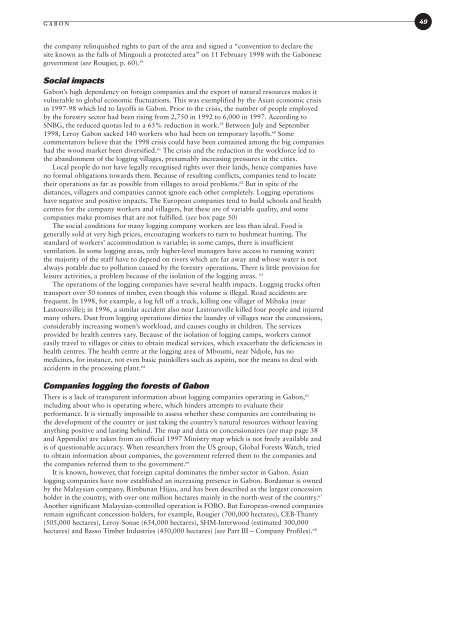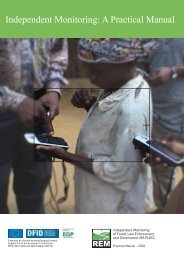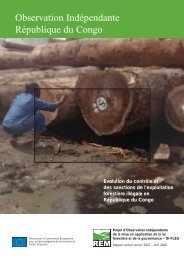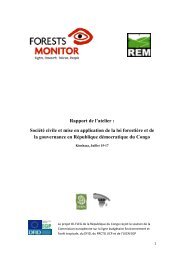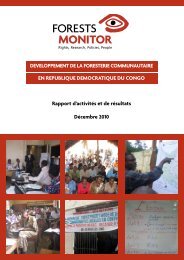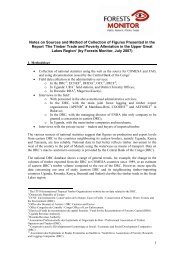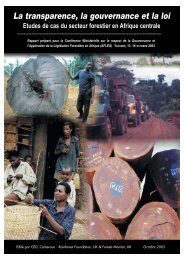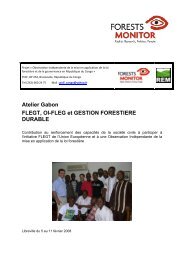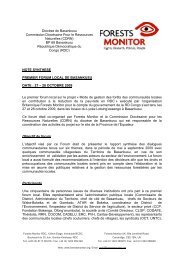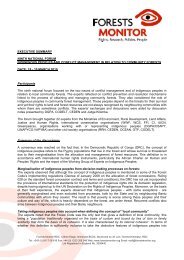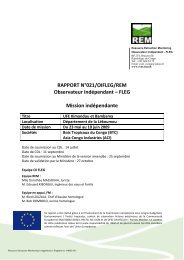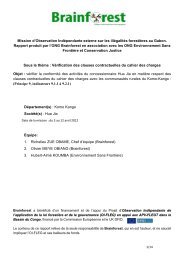Sold down the river - Salva le Foreste
Sold down the river - Salva le Foreste
Sold down the river - Salva le Foreste
You also want an ePaper? Increase the reach of your titles
YUMPU automatically turns print PDFs into web optimized ePapers that Google loves.
GABON 49<strong>the</strong> company relinquished rights to part of <strong>the</strong> area and signed a “convention to declare <strong>the</strong>site known as <strong>the</strong> falls of Mingouli a protected area” on 11 February 1998 with <strong>the</strong> Gabonesegovernment (see Rougier, p. 60). 58Social impactsGabon’s high dependency on foreign companies and <strong>the</strong> export of natural resources makes itvulnerab<strong>le</strong> to global economic fluctuations. This was exemplified by <strong>the</strong> Asian economic crisisin 1997-98 which <strong>le</strong>d to layoffs in Gabon. Prior to <strong>the</strong> crisis, <strong>the</strong> number of peop<strong>le</strong> employedby <strong>the</strong> forestry sector had been rising from 2,750 in 1992 to 6,000 in 1997. According toSNBG, <strong>the</strong> reduced quotas <strong>le</strong>d to a 65% reduction in work. 59 Between July and September1998, Leroy Gabon sacked 140 workers who had been on temporary layoffs. 60 Somecommentators believe that <strong>the</strong> 1998 crisis could have been contained among <strong>the</strong> big companieshad <strong>the</strong> wood market been diversified. 61 The crisis and <strong>the</strong> reduction in <strong>the</strong> workforce <strong>le</strong>d to<strong>the</strong> abandonment of <strong>the</strong> logging villages, presumably increasing pressures in <strong>the</strong> cities.Local peop<strong>le</strong> do not have <strong>le</strong>gally recognised rights over <strong>the</strong>ir lands, hence companies haveno formal obligations towards <strong>the</strong>m. Because of resulting conflicts, companies tend to locate<strong>the</strong>ir operations as far as possib<strong>le</strong> from villages to avoid prob<strong>le</strong>ms. 62 But in spite of <strong>the</strong>distances, villagers and companies cannot ignore each o<strong>the</strong>r comp<strong>le</strong>tely. Logging operationshave negative and positive impacts. The European companies tend to build schools and healthcentres for <strong>the</strong> company workers and villagers, but <strong>the</strong>se are of variab<strong>le</strong> quality, and somecompanies make promises that are not fulfil<strong>le</strong>d. (see box page 50)The social conditions for many logging company workers are <strong>le</strong>ss than ideal. Food isgenerally sold at very high prices, encouraging workers to turn to bushmeat hunting. Thestandard of workers’ accommodation is variab<strong>le</strong>; in some camps, <strong>the</strong>re is insufficientventilation. In some logging areas, only higher-<strong>le</strong>vel managers have access to running water;<strong>the</strong> majority of <strong>the</strong> staff have to depend on <strong>river</strong>s which are far away and whose water is notalways potab<strong>le</strong> due to pollution caused by <strong>the</strong> forestry operations. There is litt<strong>le</strong> provision for<strong>le</strong>isure activities, a prob<strong>le</strong>m because of <strong>the</strong> isolation of <strong>the</strong> logging areas. 63The operations of <strong>the</strong> logging companies have several health impacts. Logging trucks oftentransport over 50 tonnes of timber, even though this volume is il<strong>le</strong>gal. Road accidents arefrequent. In 1998, for examp<strong>le</strong>, a log fell off a truck, killing one villager of Mibaka (nearLastoursvil<strong>le</strong>); in 1996, a similar accident also near Lastoursvil<strong>le</strong> kil<strong>le</strong>d four peop<strong>le</strong> and injuredmany o<strong>the</strong>rs. Dust from logging operations dirties <strong>the</strong> laundry of villages near <strong>the</strong> concessions,considerably increasing women’s workload, and causes coughs in children. The servicesprovided by health centres vary. Because of <strong>the</strong> isolation of logging camps, workers cannoteasily travel to villages or cities to obtain medical services, which exacerbate <strong>the</strong> deficiencies inhealth centres. The health centre at <strong>the</strong> logging area of Mboumi, near Ndjo<strong>le</strong>, has nomedicines, for instance, not even basic painkil<strong>le</strong>rs such as aspirin, nor <strong>the</strong> means to deal withaccidents in <strong>the</strong> processing plant. 64Companies logging <strong>the</strong> forests of GabonThere is a lack of transparent information about logging companies operating in Gabon, 65including about who is operating where, which hinders attempts to evaluate <strong>the</strong>irperformance. It is virtually impossib<strong>le</strong> to assess whe<strong>the</strong>r <strong>the</strong>se companies are contributing to<strong>the</strong> development of <strong>the</strong> country or just taking <strong>the</strong> country’s natural resources without <strong>le</strong>avinganything positive and lasting behind. The map and data on concessionaires (see map page 38and Appendix) are taken from an official 1997 Ministry map which is not freely availab<strong>le</strong> andis of questionab<strong>le</strong> accuracy. When researchers from <strong>the</strong> US group, Global Forests Watch, triedto obtain information about companies, <strong>the</strong> government referred <strong>the</strong>m to <strong>the</strong> companies and<strong>the</strong> companies referred <strong>the</strong>m to <strong>the</strong> government. 66It is known, however, that foreign capital dominates <strong>the</strong> timber sector in Gabon. Asianlogging companies have now established an increasing presence in Gabon. Bordamur is ownedby <strong>the</strong> Malaysian company, Rimbunan Hijau, and has been described as <strong>the</strong> largest concessionholder in <strong>the</strong> country, with over one million hectares mainly in <strong>the</strong> north-west of <strong>the</strong> country. 67Ano<strong>the</strong>r significant Malaysian-control<strong>le</strong>d operation is FOBO. But European-owned companiesremain significant concession holders, for examp<strong>le</strong>, Rougier (700,000 hectares), CEB-Thanry(505,000 hectares), Leroy-Sonae (654,000 hectares), SHM-Interwood (estimated 300,000hectares) and Basso Timber Industries (450,000 hectares) (see Part III – Company Profi<strong>le</strong>s). 68


